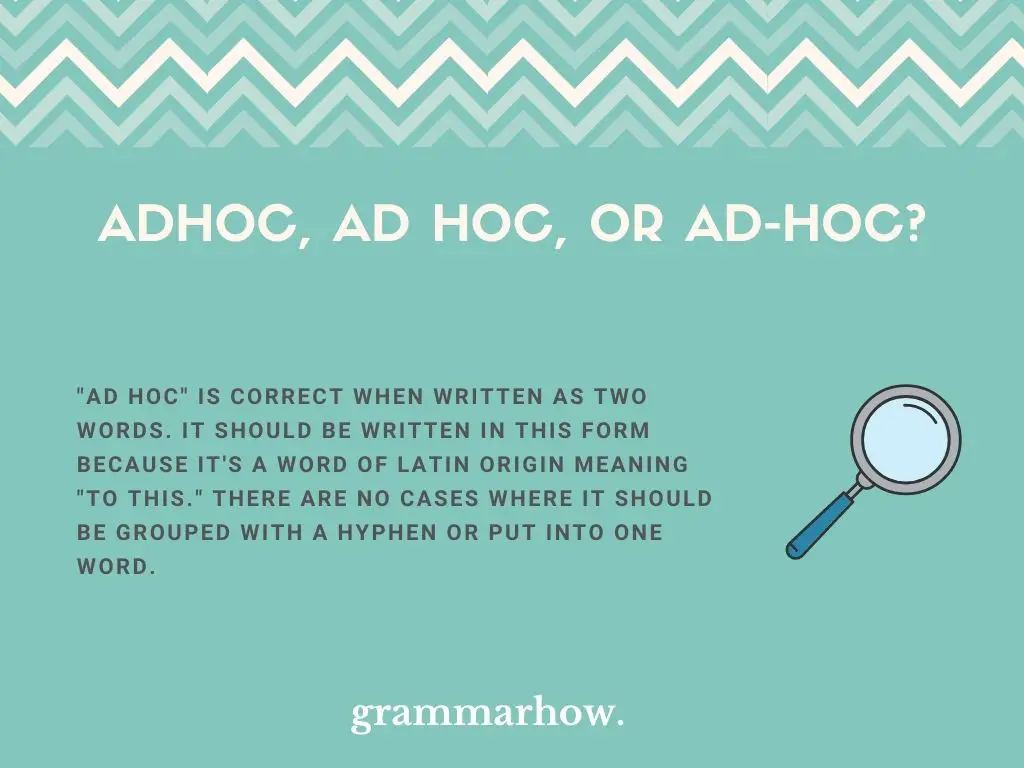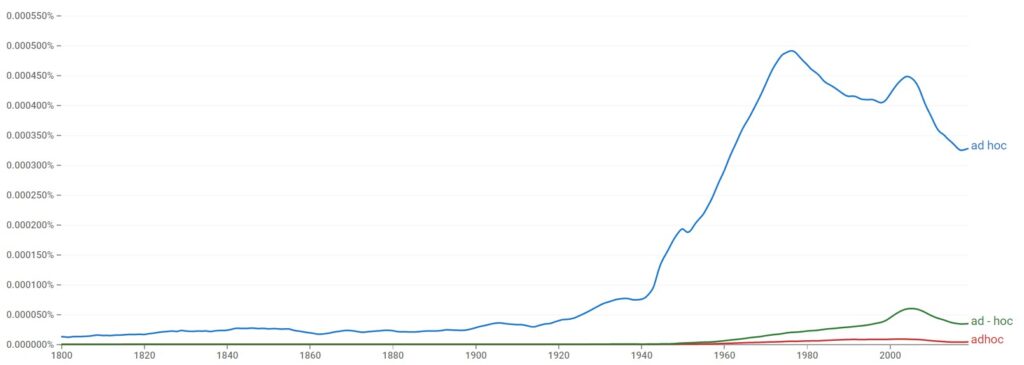“Ad hoc” is one of those old Latin words that are still commonly used in English. You might want to learn more about it and whether it’s correct as one or two words or whether the hyphenated form is more suitable. This article will explain it all.
Ad hoc vs. Ad-hoc vs. Adhoc
“Ad hoc” is correct when written as two words. It should be written in this form because it’s a word of Latin origin meaning “to this.” There are no cases where it should be grouped with a hyphen or put into one word.

According to Google Ngram Viewer, “ad hoc” is the most popular choice by a landslide. The other two variations barely even make it off of the line in comparison, which shows that they are not suitable to use.

In The Cambridge Dictionary and The Oxford Dictionary, “ad hoc” is officially defined as two words. We must make sure to write it in this form because it is a direct translation from Latin. There are never times where the hyphen or the one-word variation work.
Is “Adhoc” One Word?
“Adhoc” does not work as one word. It is an old-fashioned, Latin phrase, which means we must stick to the original definition and spelling variation. Since “ad hoc” was always written as two words, it makes sense only to use two words.
Sometimes, people like to simplify the language when they can. That means words that are two words might be transformed into one-word variations if they make more sense. However, for most Latin words, these simplifications do not apply.
Here are some examples for you:
- Correct: I need you to set this up ad hoc.
- Incorrect: Can we talk about the adhoc meeting you had without me?
- Correct: I need to get over there ad hoc, and I won’t have you waste my time.
- Incorrect: I don’t know why he wants the adhoc address to be given tonight!
Is “Ad hoc” Two Words?
“Ad hoc” should always be written as two words. This works because it’s a direct construct from early Latin writing, which translates to “to this.” We do not include a hyphen, and we do not group the words into one. It makes the most sense to keep it as written.
Check these examples out if you’re not sure about it:
- I would like to talk to you about this ad hoc. Do you have the time?
- The ad hoc committee was formed very early in the morning, much to my dismay.
- This is far too ad hoc to be worth my time! I need more preparation than this.
- I need help ad hoc! Someone, please come over here right now to give me a hand!
Is “Ad-hoc” Hyphenated?
“Ad-hoc” does not work when it is hyphenated. It is an old Latin phrase meaning “to this,” which means that something is set up when necessary. Since it’s an old phrase, we do not adapt it with hyphens as we might do in modern English writing.
Sometimes, we would refer to the AP Stylebook to learn how the hyphenation works for multiple words. However, according to AP Style, even when “ad hoc” is an adjective, we still do not group the words with a hyphen.
Here are some examples to show you that only the two-word variation works:
- Correct: The ad hoc meeting was set up to have an immediate discussion about conduct.
- Incorrect: We really need to discuss this ad-hoc. When works best for you?
- Correct: I have nothing left to do ad hoc, but I will try and stick around to help you out.
- Incorrect: I am not sure you want an ad-hoc discussion with me. It won’t do you any good because I’m far better prepared.
Is “Hoc” Capitalized In The Word “Ad-Hoc”?
Usually, we would talk about the capitalization rules of hyphenated words here. However, “ad-hoc” is never correct, so we cannot talk about which part should be hyphenated.
Nevertheless, if you’re using “ad hoc” as two words, there is no need to worry about hyphenation. It is not a proper noun, so the only time you might deem it necessary to capitalize it is when it starts a sentence or is written in a title.

Martin holds a Master’s degree in Finance and International Business. He has six years of experience in professional communication with clients, executives, and colleagues. Furthermore, he has teaching experience from Aarhus University. Martin has been featured as an expert in communication and teaching on Forbes and Shopify. Read more about Martin here.

